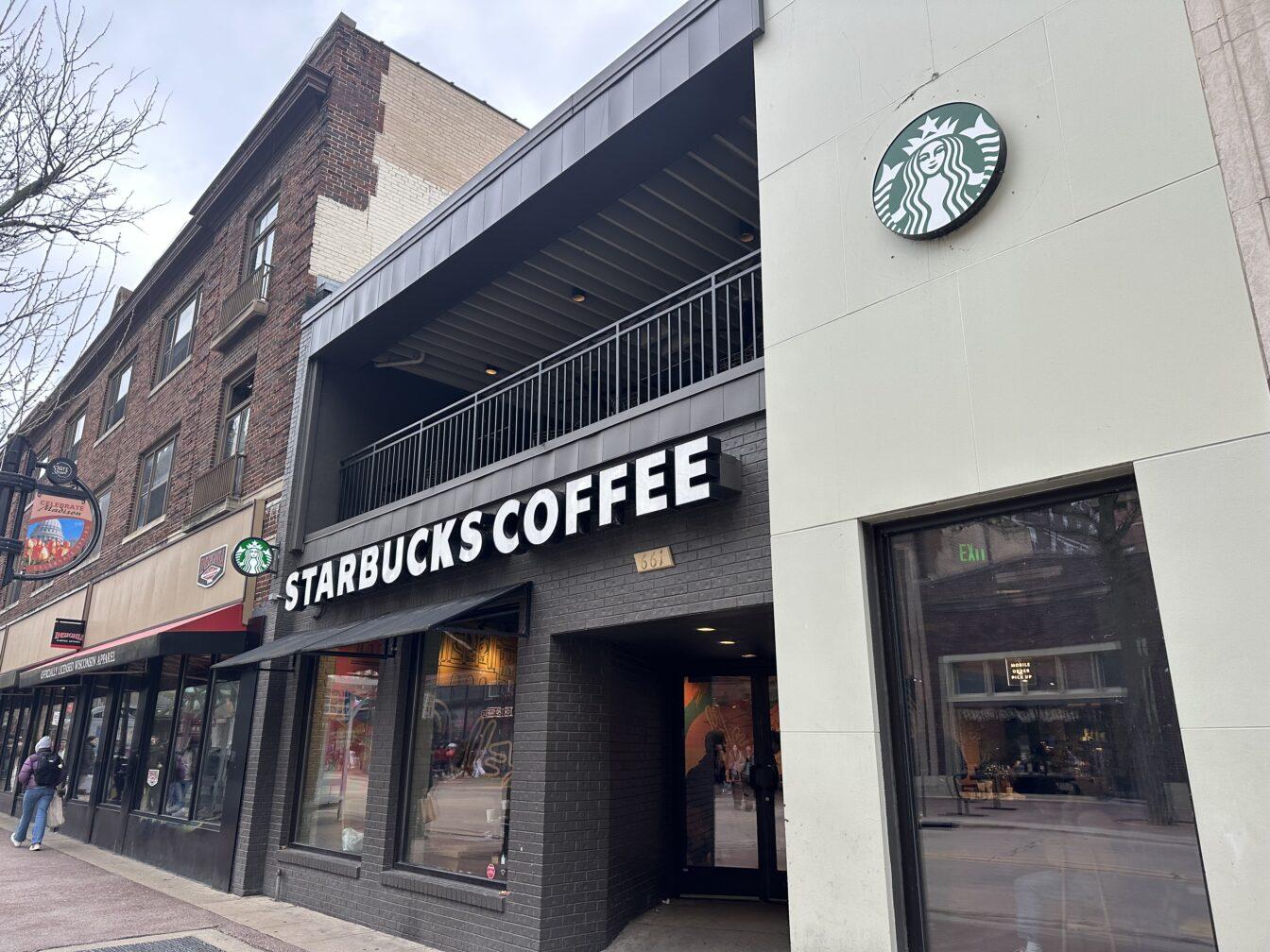Workers at the State Street Starbucks store publicly announced their decision to seek unionization Tuesday.
Union organizer and shift supervisor at the State Street location Matthew Cartwright said over 75% of the workers at the State Street location have signed union cards — authorization documents that allow a union to negotiate terms and conditions on behalf of the employee. They will be demanding an election soon to officially join the union.
Thirty-six workers at the State Street location signed a letter to Starbucks CEO Laxman Narasimhan. The letter states that directives from upper management about “store equipment, labor allocations, and priorities” lack input from store-level partners.
“We have tried to maintain this direct relationship, and the result has been intimidation, labor cuts, and unclear standards,” the letter said.
Cartwright said there has been overwhelming support of their efforts.
“To the best of my knowledge, we are one of the largest stores to ever unionize,” Cartwright said. “We have some 52 partners working on our store. We have managed to organize this store in about a week, which is a record pace.”
UW junior and shift supervisor at the State Street location Jack Savin said the decision to unionize stems largely from feeling unheard by upper management at Starbucks. He said it feels like young baristas, shift supervisors and other lower-level workers at Starbucks don’t have a seat at the table.
The decision by the State Street store follows both local and national trends of Starbucks workers moving to unionize. Workers at the Capitol Square Starbucks location announced they would seek unionization in March 2022.
Savin said the State Street Starbucks has worked closely with the Capital Square location, who have shared resources and connected them with union organizers. Most importantly, Savin said they have listened to the problems faced by State Street workers.
“They’ve been listening to the stories we share with them and what struggles we’re facing at our store,” Savin said. “[They have been] hearing us out and telling us how a union can help us, what that means and what it could look like for us.”
Starbucks stores in Wisconsin cities like Plover, Oak Creek and Green Bay have also sought union representation.
In an email statement to The Badger Herald, member of the State Street Starbucks organizing committee and barista Allie Kerr said this movement brings to the fore issues that workers are facing everywhere. She said it shouldn’t have to be intimidating to come together with your colleagues and speak to your employer.
“People want to do good and meaningful work, and they want to be compensated fairly for their efforts,” Kerr said. “Seeing baristas advocating for themselves can encourage others to do the same. The more we push for what we need, the more likely we are to have our needs met. I think that this movement can also make unionization efforts feel less scary for people.”
The national movement for Starbucks to unionize began in December 2022 in Buffalo, New York, when baristas voted to unionize. Since then, over 350 Starbucks stores have petitioned the National Labor Relations Board to hold union elections.
But, according to the Associated Press, unionization efforts have slowed, in part due to Starbucks’ aggressive response. This has included closing stores that unionize and firing pro-union workers. Cartwright said he has received threats against his job from people high in upper management.
But Cartwright said he doesn’t think the unionization movement will continue to slow down. Instead, he said he is hopeful that Starbucks will be receptive, and he is excited to inspire other stores across the U.S.
“We unionized very fast, and I think more stores will start to join us,” Carwright said. “I think State Street — a sort of flagship store for Starbucks in Wisconsin — will be a very good example to the rest of the stores across the state. And I think this will help energize people, as well as break the fear [of unionizing].”
In Wisconsin, the strength of public and private unions weakened under state policies like Act 10, legislation passed under former Republican Gov. Scott Walker. Between 2011 and 2020, the unionization fell by 35%.
Kerr, who has worked at the State Street Starbucks for five years, said the efforts at the State Street Starbucks represent a continuation of the proud progressive ideals that used to be a strong Wisconsin tradition.
“Our proximity to campus creates a unique atmosphere and unique needs for our store,” Kerr said. “Most modern corporate initiatives are not designed with places like State in mind, and as a result, they can make it more difficult for us to be successful. By unionizing, we are hoping to gain a seat at the table and work collaboratively with Corporate on initiatives to keep our store successful and keep our partners feeling respected.”
Savin said the strong community at the University of Wisconsin has been supportive — something he does not take for granted.
Cartwright said he would define the unionization process as energetic.
“The students here are young like me, and we care a lot about democracy,” Cartwright said. “We care a lot about our voices being heard and democracy starts in the workplace. That’s what this is about.”
Starbucks negotiates with the union through “collective bargaining” — a five-step process in which involved parties debate and vote on contract proposals — after a store votes to unionize, according to One Starbucks.
Editor’s Note: This article was updated to include information from the letter to CEO Laxman Narasimhan.


